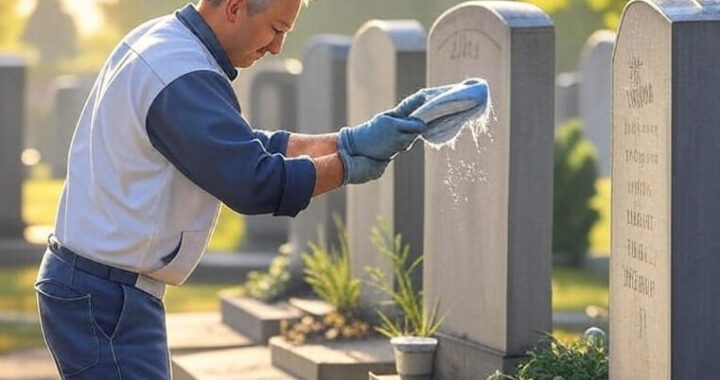Cleaning headstones helps keep cemeteries respectful and peaceful. Over time, headstones can get dirty from moss, mold, bird droppings, or air pollution. Professionals use the right tools and methods to clean them without causing damage.
The Right Tools for the Job
Cleaning a headstone is not like washing a car. Most pros use soft brushes, spray bottles, plastic scrapers, and clean water. They do not use power washers or strong chemicals.
For example, John Miller, a monument care worker in Ohio, uses a mix of water and a product called D/2 Biological Solution. This is a safe cleaner that removes stains from pollution, algae, and lichens. He says it works best on marble and granite, and it does not hurt the stone.
Another cleaner, Lisa Park, works for a cemetery in Vermont. She says that many old headstones are made of soft stone like sandstone or limestone. These can crack or chip if scrubbed too hard. She uses a nylon brush and lets the cleaning solution sit for a while before wiping it off.
Steps in the Cleaning Process
-
Check the stone – If the headstone has cracks or is flaking, they may not clean it. Damaged stones can break.
-
Wet the surface – Water keeps the stone from soaking in dirt.
-
Apply cleaner – Only cleaners that are safe for stone are used. No bleach or harsh chemicals.
-
Brush gently – Brushes should be soft. Metal brushes scratch the stone.
-
Rinse well – All cleaner must be rinsed off to stop damage.
-
Drying – The stone should be left to dry on its own.
These steps help the stone last longer. The Natl. Park Serv. says that too much cleaning can hurt headstones. Most stones should only be cleaned once every year or two.
Respect and Memory
Professional cleaners know that each headstone marks a life. Many feel proud to help families remember loved ones. It is not just a job.
One worker said, “I cleaned a stone that hadn’t been touched in 40 yrs. The name showed up again, and the family cried when they saw it.” That is why careful cleaning matters.
Some people think any cleaner can be used. But in 2018, the Assoc. for Gravestone Studys warned that bleach can cause salt buildup. Salt causes craks in marble and sandstone.

Quick Tips
-
Use only soft tools
-
Use cleaners made for stone
-
Don’t clean damaged stones
-
Avoid bleach and acid
-
Rinse with clean water
Common Cleaners Used
-
D/2 Bio. Sol.
-
Orvus Paste (mild soap)
-
Clean H₂O
Final Thought
Cleaning a headstone is not just about looks. It is about care. It helps honor those who came before. With the right tools and knowlege, professionals can clean stones without harm.
Next time you see a bright stone in a quiet graveyard, think about the hands that cleaned it and the family that remembers.

